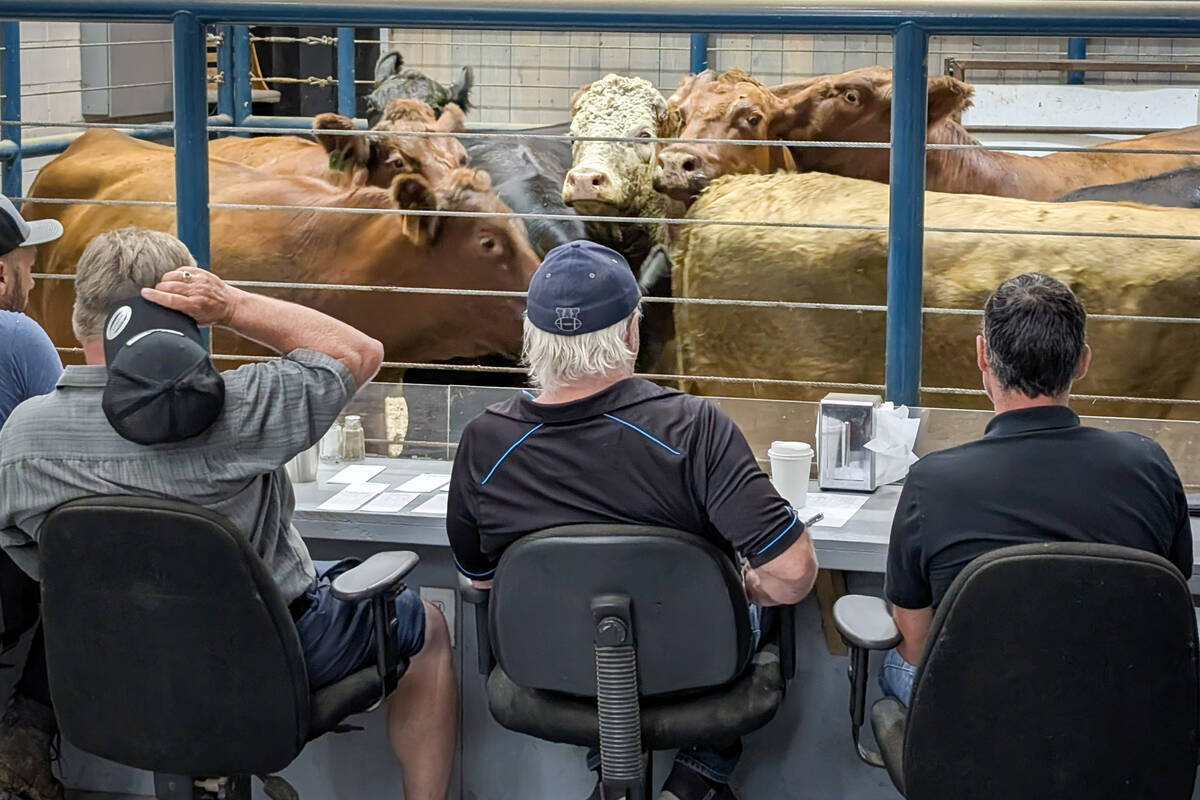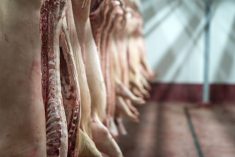About 70,000 pigs are trucked into the United States every week. Western Canadian pork producers want to be sure no porcine epidemic diarrhea virus travels back to this country via trucks on the backhaul.
They object to the Canadian Food Inspection Agency’s decision to enforce previous swine transport truck washing regulations as of today as temporary emergency protocols expire.
According to federal Health of Animals regulations, trucks must now be washed on the American side of the border before they return to Canada.
It sounds like a good idea, except that U.S. truck washes may not result in eradication of the virus.
Read Also

U.S. livestock: Cattle rally, hogs slide
Chicago cattle futures regained a ground on Monday to maintain a fairly level trajectory after last week’s fall.
PED is endemic in the U.S., where it has killed millions of piglets, and the virus travels easily in feces and on other surfaces. Trucks are considered a major potential risk of disease spread.
But swine producer groups, the Canadian Pork Council and provincial veterinarians in the three prairie provinces all recommend that trucks be sealed on the U.S. side and then go directly to a certified truck wash in Canada for thorough cleaning, disinfection and drying.
That is the process used during a temporary emergency protocol allowed by the CFIA from February 2014 until today.
There have been only five premises infected with PED in Western Canada and all are now free of the virus. The hog industry attributes that success in part to the emergency protocol for truck washing.
Manitoba Pork general manager Andrew Dickson said today that CFIA’s decision to now enforce regulations will introduce greater risk of PED infection in Canada.
He said most U.S. commercial truck washes do not accept trucks containing bedding material. Such material is common in Canadian loads for animal safety and comfort reasons over long distances.
That can mean trucks must travel to wash facilities that do accept trucks with bedding, adding time and expense.
Dickson also said some U.S. truck washes use recycled water and there are no enforced standards.
“It introduces an element of risk that we don’t need to do,” he said.
Dickson said the modern Canadian hog industry is being subjected to risk from old CFIA regulations that haven’t been changed in years.
The CFIA, on its part, said it is legally obligated to enforce the regulations as they are written.
The industry has appealed to federal agriculture minister Lawrence MacAulay to intervene but Dickson said there has been no response.
“We’re hoping the minister will come to the table,” he said.
In a news release issued April 29, Manitoba Pork said May 2 represents “a crisis moment for the Canadian swine industry.”
“As of May 2, 2016, the government will demand that livestock trailers be washed at U.S. facilities before crossing the border into Canada, even though there is no evidence that such facilities will not contaminate disease-free Canadian transporters,” the release said.
“The government continues to ignore professional advice from practicing veterinarians, all the major swine producer groups, the chief veterinary officers of the three prairie provinces, and swine health researchers.”
Alberta Pork added similar objections.
“This move to enforce this outdated federal regulation has the potential to not only create a significant level of animal suffering but also economic and emotional hardship on our producers and their families,” it said in its own news release.
“The PED virus in the U.S. has caused the death of over seven million pigs in the U.S. We do not want that suffering in Canada.”
Hog groups are urging producers to insist that any truck returning from the U.S. be washed in a certified Canadian facility.
That means trucks will be washed once on the U.S. side and again on the Canadian side, doubling the expense. However, Manitoba Pork said it is necessary to protect the industry.
“Producers should assume that trailers washed only at U.S. facilities are almost certainly contaminated with the PED virus.”
It has called on MacAulay and the CFIA “to commit in the next four weeks to working collaboratively with industry representatives to reduce the risk of this fatal virus devastating Canada’s swine herd.”
Contact barb.glen@producer.com















